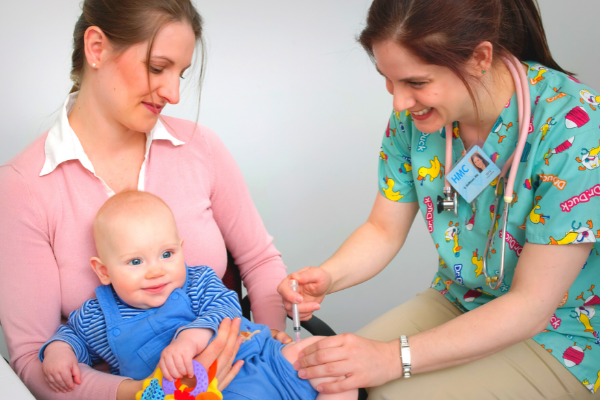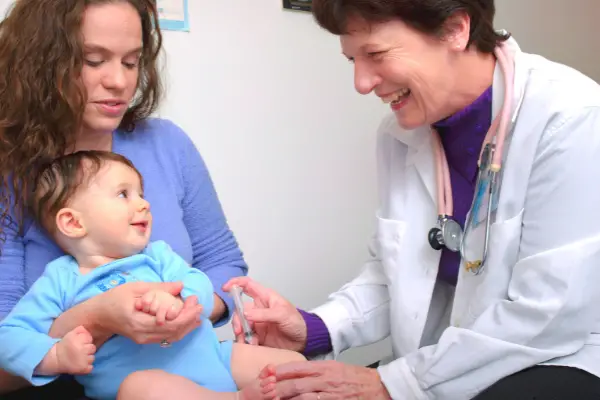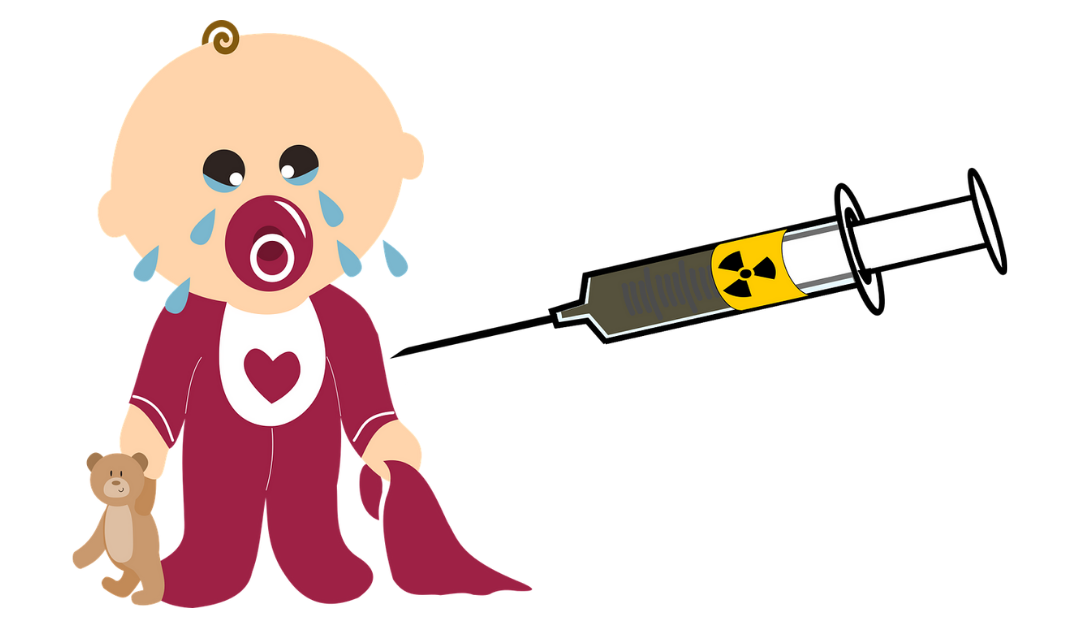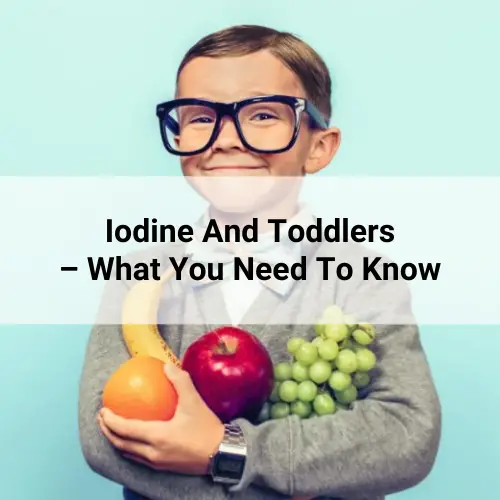Vaccinations for babies is a very contentious subject. There is so much conflicting information provided to parents that it can be really difficult to sift out the truth and decide where you stand with vaccinations.
One thing can be certain, and that is the fact that vaccinations have helped eradicate many serious diseases, and that they protect children from certain illnesses from infancy to adulthood.
In order to understand vaccinations, one needs to know what they contain, how they work, and which common myths just aren’t true.
Table of Contents
What is in a vaccine?
Vaccines have been formulated to help the body build up an immunity to certain diseases. Different vaccines are made for different diseases, and the materials used to make them differ. Here are some of the materials that vaccines may contain:
• An incredibly small amount of a weakened, live form of the virus
• An incredibly small amount of killed bacteria, or even just parts of the bacteria alone
• A small amount of a modified toxin produced by the bacteria
• Small amounts of a preservative or antibiotic which helps to preserve the vaccine
• Aluminum salt which promotes a better immune response
How long do vaccines take to work?
Many vaccines require multiple doses over a period of time in order to be effective. The immune system usually takes a couple of weeks to respond after the initial vaccination.
Completing the course of a vaccination is the best way to ensure that a child is properly protected against the disease.
How long does immunization from a vaccine last?
There are some vaccinations that last a lifetime, but many do require a booster dose at some point.
The booster dose helps to increase the effectiveness of the first vaccination, making it stronger rather than having the immunization wear away.
Booster doses also help reduce the chance of a possible failure. All vaccinations have a possible failure rate, so a booster dose is vital to ensuring the efficiency of the vaccine.
Why are children vaccinated?
Children are the most susceptible to contracting a serious disease. They are at the most vulnerable age of being sick and contracting childhood diseases such as mumps, measles, and whooping cough.
Their immune system has not had the chance and time to develop like an adult has and needs additional protection to fight off these illnesses.
While there are antibodies shared through the placenta during pregnancy and then through breast milk, these do wear off after time.
What are the side effects of vaccines?
Most babies or children will experience redness and soreness at the point of the injection, which can be followed by a mild fever. The side effects of vaccines are usually mild and only last around 1-2 days.
With the MMR vaccination, a baby can have a reaction 5-12 days after the vaccination is administered.
It will probably last around 2 days but does not make your child contagious or at risk. These symptoms could include a faint rash, mild fever, head cold, cough, and a runny nose.
The neck glands may also swell up due to the mumps part of the vaccination.
These are also treated at home and shouldn’t be cause for concern.
However, if your child experiences any other side effects or has a severe reaction to the vaccination, you should take them to see a doctor immediately.
Common Misbeliefs

Diseases aren’t serious
All of the diseases which are vaccinated against in childhood are serious and even deadly. Most can cause serious health complications and lead to death. There is no cure for most of these diseases, so even the best medical care might not be effective enough to fight it off.
Vaccinations aren’t necessary because nobody suffers from these diseases anymore
The diseases still exist. The viruses and bacteria never die off completely, they are still present around us. However, vaccinations prevent these diseases from spreading, making them seem like they have disappeared altogether. If vaccination rates drop, the instances of infection will rise.
In countries with low vaccination rates, diseases are common, where they would not be found in countries with high vaccination rates.
My child does not need to be vaccinated if everyone around them is vaccinated
The only way to protect your unvaccinated child from disease is by vaccinating them. If more parents think this way, more children will remain unvaccinated, which means disease and bacteria will be able to spread easily.
Vaccines should be given one at a time
Many vaccinations are now combined immunizations. This means that protection from more than one disease can be given with a single vaccination. An example of this is the MMR vaccine, which helps prevent measles, mumps, and rubella.
These combination vaccinations are both safe and effective. Having a combination injection also means your child is protected against these diseases earlier, instead of having to wait for one injection at a time.
My baby will experience fewer side effects if they are immunized later
Side effects from vaccinations in babies are just as common as side effects of vaccinations in children. The vaccinations were designed to be given to babies, as early as 2 months old. They will have extended protection from disease if they are given the immunization early.
Vaccines haven’t been properly tested
Vaccines and immunizations are safe and effective. There are many steps, trials, and tests that vaccines have to go through before being approved by a respective health commission. The side effects of vaccines are continuously monitored to ensure ongoing safety.
Breastfeeding is the best protection against infections
While breastfeeding does have amazing benefits and does help offer your baby some protection against disease and infection, it is not a substitute for vaccinations. The protection from breastfeeding can be ineffective if your baby is exposed to a large number of germs, and it also doesn’t protect fully against the more serious of diseases.
Natural substances are better

The MMR Vaccine and Autism
This is probably the most prominent debate when it comes to anti-vaxing. Many people believe that vaccinations, specifically the MMR vaccine, can cause autism.
The belief that MMR causes autism in children was born from a single paper which was published in 1998. This report suggested that there might be a link between autism and immunizations. However, this report was written off as fraudulent and was eventually withdrawn from the journal in which it was published.
There is absolutely no scientific proof that vaccinations cause autism. The reason the prevalence of autism in children has increased in the last few years is that we are only now able to recognize the signs and symptoms of milder cases in children. In the past these children would have lived their lives without being diagnosed at all, it does not mean that they weren’t autistic. Scientists have also recently found a gene linked to autism, which shows that a child is actually born with autism, and it is not the result of an environmental factor or a vaccine.
Another theory is that thimerosal in vaccines causes autism. Thimerosal is a preservative which used to be used in vaccinations. This preservative hasn’t been used in many years, so the argument falls short.
Herd Immunity
If you read up on the debate for and against vaccines, you may have come across the term “herd immunity”. Simply put, “herd immunity” happens when most of the people in a community are vaccinated against a certain disease. This disease then cannot find hosts and will then ‘disappear’. Using this theory, it is safe to believe that when people stop vaccinating their children, diseases such as measles and polio will have more hosts to infect, and therefore become prevalent again in society.
Vaccinations and babies
As a parent, you have a responsibility to keep your child safe. This includes giving them the best protection possible from serious illness and disease. You also have a responsibility as a member of your community to help keep these diseases at bay. Vaccinating your children is the best way to ensure both of these things.
Saying this, it is important to do your own research and make your own informed decision. You need to be comfortable with the choices you make, and be sure of the fact that it is the best decision for you, for your child and for your community as a whole. Knowledge is power, and it is our best bet in ensuring that serious illnesses and diseases are kept at bay.
Keep your family safe through this home air purifier with an advanced filtration system. Click here for more details.
Related Articles:





